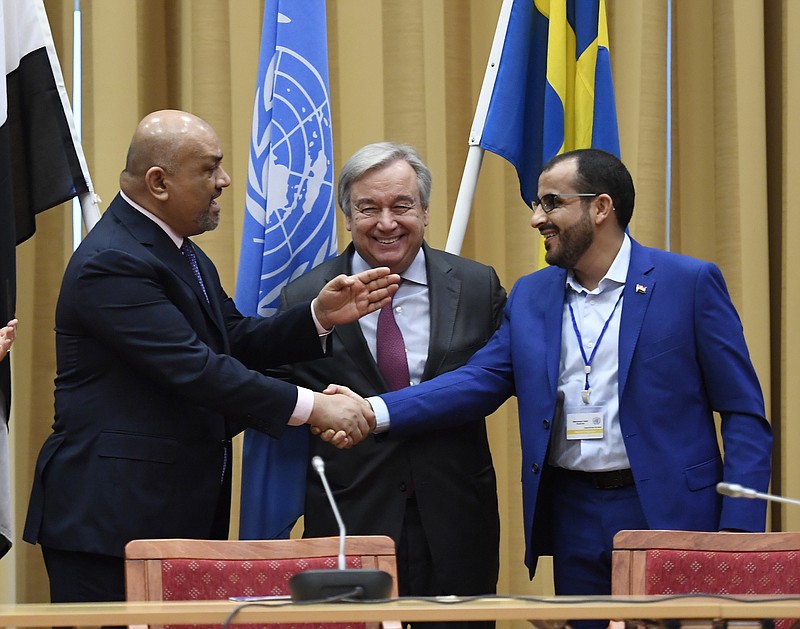RIMBO, Sweden (AP) — Yemen’s warring sides agreed Thursday to an immediate cease-fire in the strategic port city of Hodeida, where fighting has disrupted vital aid deliveries and left the country on the brink of starvation in the 4-year-old civil war.
The agreement includes a withdrawal of combatants to outside the city limits within two weeks and was praised by U.N. Secretary-General Antonio Guterres as “real progress” to alleviate Yemen’s suffering and show commitment to a political solution.
The truce, along with a mass prisoner exchange agreement reached earlier, were seen as important first steps toward further talks in January aimed at drawing down a stalemated conflict that has killed thousands of people and left millions more in misery in the Arab world’s poorest country.
The cease-fire and pullback of forces eases fears the battle for Hodeida could force an outright closure of its port, which would have been disastrous, since it is the main entry point for food and other humanitarian aid for millions of Yemenis. Throughout months of fighting around Hodeida, the port remained open, although movement of aid out of the city to the rest of the country was slowed because it had to avoid the front lines.
However, the deal might not mean an immediate or significant difference in easing the suffering of Yemenis. Ships bringing supplies into Hodeida must still undergo strict searches by U.N. monitors to ensure no weapons are aboard, a process that has delayed deliveries.
Once in the country, it is a struggle to get food to families who need it because of corruption or mismanagement. More than 22 million of Yemen’s 29 million need humanitarian aid, and the most desperate — more than 8 million — have no food other than international relief supplies.
Guterres announced the truce during peace talks in Sweden, where he thanked the delegations.
“It will improve the living conditions for millions of Yemenis,” he said.
“The fact that we came to an agreement on Hodeida, that many would consider the most difficult of the problems on the table, give us the hope that this process will now be moving step by step and that we’ll be able to overcome all the obstacles that we face,” Guterres told reporters after a closing ceremony in a castle in the town of Rimbo outside Stockholm.
In a sign the talks appeared to make more progress than previous rounds, Yemeni Foreign Minister Khaled al-Yamani and Houthi delegation head Mohamed Abdelsalam shook hands at the closing event.
The conflict pits the internationally recognized Yemeni government, supported by a Saudi-led coalition, against the Iran-backed rebels known as Houthis. The U.S. is supporting Saudi Arabia’s effort in the war.
The fighting has produced one of the world’s worst humanitarian crises, according to the U.N. The two sides have been locked in a stalemated fight over Hodeida for months.
The U.N.-sponsored talks began last week with low expectations but saw some progress with the agreement of a prisoner swap involving about 15,000 captives, scheduled to occur by Jan. 20.
Both sides have said they sought to build on the goodwill. U.N. envoy Martin Griffiths has said he wants to remove Hodeida from the conflict so that aid can flow freely. Thursday’s agreement aims to do just that, with troops retreating to outside the city limits and a province-wide cease-fire.
“This will be the first withdrawal of any forces in the history of this conflict. And it will be done in the area of the greatest sensitivity, and difficulty and danger,” he said, adding that other areas under discussion will continue in the weeks and months ahead.
On Wednesday, he said he gave both sides a draft agreement for consideration that included proposals for reopening the airport in the capital of Sanaa, as well as one for a political framework for a postwar Yemen.
It was unclear how far they have come in agreeing on those broader issues, although some progress was announced toward drawing down fighting in the central city of Taiz and creating “humanitarian corridors” — localized cease-fire zones — to allow in aid shipments.
Asked if rivals Iran and Saudi Arabia had been involved behind the scenes, Guterres said they had played a constructive role in the Yemeni-led talks.
“Obviously there has been very relevant consultations with (Iran and Saudi Arabia) and all other regional parties, and I must say I am very grateful for the very constructive approach that I have felt in the last few weeks in order to facilitate creating the conditions for this agreement to be possible,” he said.
The World Food Program welcomed the cease-fire announcement, saying it offers hope for millions of Yemenis.

